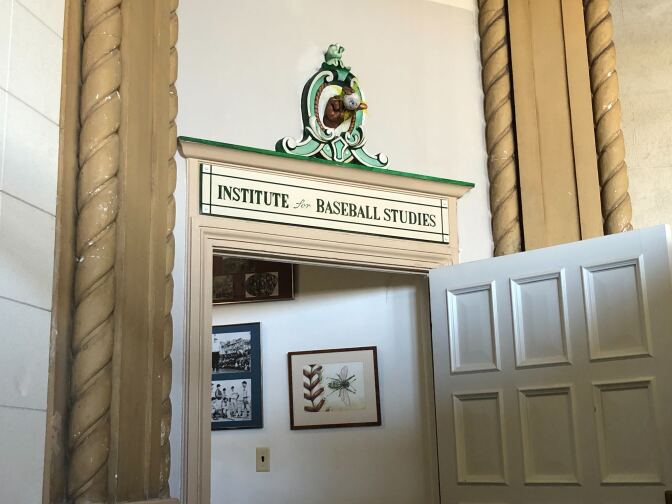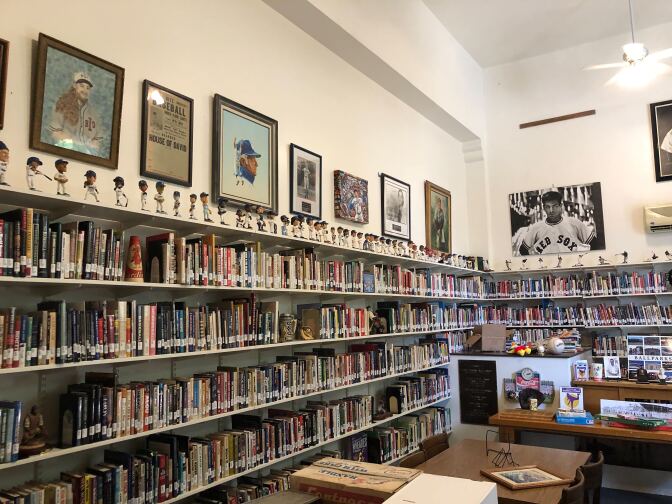This story is free to read because readers choose to support LAist. If you find value in independent local reporting, make a donation to power our newsroom today.
For The Baseball Obsessed, Whittier College Has A Treasure Trove Of Artifacts, Books — And Bobbleheads

Nestled into a quaint hillside in Whittier, you can find a slice of baseball heaven.
Thousands of books, souvenirs, and artifacts, all dedicated to academic research on the social and cultural history of the sport, and its mighty impact on American life.
The treasure trove is housed inside the Institute for Baseball Studies, on the small private liberal arts campus of Whittier College.
“If you’re even remotely interested in baseball, the history of baseball, or the cultural connections of the sport, there’s probably no other space or collection like this,” said Nathan Landau, the Director of Sports Science with the San Diego Padres, who was a student at Whittier College when the Institute for Baseball Studies first opened its doors.
“If you’re in Southern California, you have this amazing institute and its resources at your fingertips,” he said. “You’re not going to find anything else like this, I believe, in the world.”
While the institute was closed during the pandemic, it’s now open again to the public, with visits by appointment. Climb up the stairs to the third floor of the Spanish-style Mendenhall building and you’ll be greeted by tightly packed bookshelves holding more than 3,000 books, dozens of bobbleheads, racks of vintage jerseys — including a replica pinstripe of the Negro League team Kansas City Monarchs — various portraits of former players, and baseball-inspired art pieces.

The Institute's History
The library was created in 2014 from the collaboration of Whittier College professor emeritus Joseph L. Price and Terry Cannon, the late founder of the Baseball Reliquary (a traveling baseball history museum from Pasadena) along with Whittier professors Charles Adams and Michael McBride.
“In 2012, Terry Cannon approached me about the possibility of housing the bound archives and historical materials related to exhibits that the Baseball Reliquary had done,” Price said. “Although we weren’t able to work out an agreement with Whittier College’s library at that time, Terry and I persisted and worked with the administration over the next two years to found the Institute for Baseball Studies.”

Professor Price remembers that the administration wasn’t sure whether the institute would be a good idea.
“At the time, the former President of Whittier College, Dr. Sharon Herzberger, thought that the institute was a quirky idea. But she thought it would perhaps keep me, Charles Adams, and Mike McBride connected with the college since we were three retiring faculty members,” Price said.

Quirky or not, news about the institute quickly spread like discarded peanut shells on a stadium floor as the space began to build a reputation as one of the premier places for exploring baseball as a cultural concept.
“When she retired in 2018, she admitted to Terry Cannon that she had no idea that this was going to get such public use and attention,” Price said. “It succeeded in building bridges to the community and various baseball scholars throughout the nation.”
Today the institute claims more than 9,000 baseball fans online.
Memorabilia
The collection has grown thanks to significant donations from the local business community, baseball historians, and even former Los Angeles Dodgers General Manager Fred Claire, who helped lead the team to a World Series victory in 1988.
Claire donated multiple items from his collection of Dodgers memorabilia that he accrued over the years, including baseballs signed by each team member from the 1984 Olympics.

Professor Price mentioned a few items of note from the institute that are his favorites.
“We have an advertisement for the Hayward Hotel during the first year the Dodgers were in Los Angeles in 1958,” said Price. “For $14.25, a person could get a shared double room at the hotel, a ticket to the Dodger game at the L.A. Memorial Coliseum, transportation to and from the ballpark, breakfast, and a ballpark snack included.”

“All of that for what would be less than the price of one of the better brews at Dodger Stadium today,” he said.
Other notable items of early Dodgers artifacts include a framed souvenir issue of the April 18, 1958 edition of the Los Angeles Examiner’s front page welcoming the Dodgers for their first home game at Chavez Ravine.

“Recently, we cataloged a few new pieces,” said Price. “We found that we have a piece of Josh Gibson’s catcher’s mitt from the early 1940s. Gibson was one of the superstars of the Negro Leagues and was the second Black player to be inducted into the Baseball Hall Of Fame. It’s a sliver of leather authenticated that we hadn’t realized existed,” Price said.
He also mentioned some pieces currently on exhibition at the L.A. Public Library. One is an art piece titled The House That Rube Built by artist Greg Jezewski, "a beautiful triptych tribute to the Negro Leagues,” he said.
Joy Of Baseball
Another is the full mascot costume of the famous San Diego Chicken. When it isn’t on display, the Institute has the cartoon chicken’s head resting on a ballpark chair in the main room.
“Our authentic replicas, artifacts, and literature all speak to how baseball provides one way to understand the diversity, the innovation, and the sheer joy of what it means to be able to experience the positive aspects of American culture,” Price said.
“Baseball can inspire creativity and innovation, and the study of it can intersect with various disciplines in the humanities and social sciences.”

Nathan Landau, of the San Diego Padres, recalls that in the beginning, the institute was an inside secret for those in the know, like the hand signals exchanged between players on the field during a tense game. However, it was only a matter before the institute’s unique appeal began to catch on.
“We saw it grow very rapidly,” Landau said. “At first, there was just a small group of students who were interested in using the space’s resources. But, as more people found out about it, and articles were written about it, it kind of branched out into the public sphere, and it became more and more popular.”
“I knew I wanted to do my thesis centering around baseball,” Landau said. “Professor Price assembled literature and resources for me that I couldn’t find anywhere online. I don’t know how he found them, but he got me resources that helped me explore the economic and cultural impact of the Dodgers’ move from Brooklyn to Los Angeles.”
If you’d like to plan a visit to the Institute for Baseball Studies, Price says they’re now taking appointments. Weekdays are preferable, but he notes that weekend times are possible if given notice.
The annual Shrine of the Eternals, the Baseball Reliquary’s version of the Baseball Hall of Fame induction ceremony, will be held at the Los Angeles Public Library on November 5.
To schedule an appointment, contact Professor Price at jprice@whittier.edu or baseballstudies@whittier.edu.







